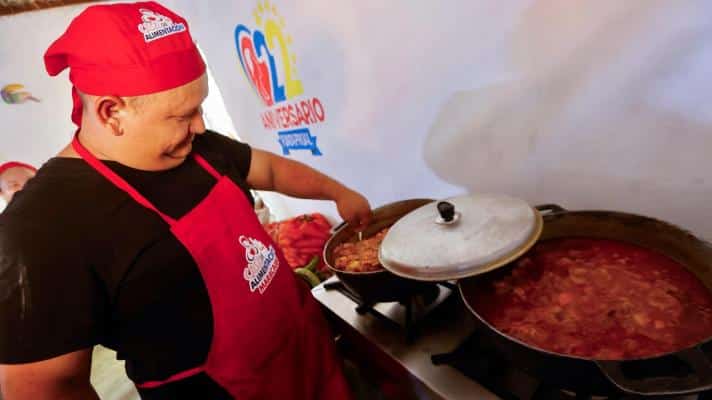
Venezuelan chef at work: the Zulia government has created kitchens dedicated to vulnerable people. Photo: government of Zulia state, Venezuela.

Orinoco Tribune – News and opinion pieces about Venezuela and beyond
From Venezuela and made by Venezuelan Chavistas

Venezuelan chef at work: the Zulia government has created kitchens dedicated to vulnerable people. Photo: government of Zulia state, Venezuela.
By Misión Verdad – Jul 31, 2025
Venezuela’s Bolivarian Revolution has done it again: it is once again on the verge of eradicating hunger in Venezuela. This was recognized by the FAO, IFAD, UNICEF, WFP, and WHO in their annual report on The State of Food Security and Nutrition in the World 2025 (SOFI 2025), addressing high food prices and inflation for food security and nutrition.
Since the imposition of illegal coercive measures (euphemistically referred to as sanctions) by the US and its allies on Venezuela in 2014, and after 11 years with a burden of 1,041 Unilateral Coercive Measures (MCU) on the nation, which places it between the fifth and sixth most sanctioned country in the world depending on the source, the country has once again reduced the hunger that appeared amid the economic, financial, and commercial blockade perpetrated against the national government as part of the war to stifle the economy, prevent the supply of essential goods, and negatively impact food security and sovereignty, with the goal of imposing the failed regime change.
This scourge had disappeared in Venezuela since 2006, removing the country from the world hunger map thanks to the public policy of former President Hugo Chávez, which was based on social missions that promoted economic access and food availability for the entire population.
It was in 2015 when undernourishment reappeared in Venezuela and increased in proportion to the number of MCUs imposed, which, according to the FAO, reached its peak in 2019.
This occurred just as the Venezuelan opposition to the socialist government, with the support of the United States and the Lima Group, attempted to impose a virtual and unsuccessful parallel government, when the narrative of a fabricated food crisis was the channel for carrying out a “humanitarian” military intervention in the country, endorsed by the international community, which would allow the objectives of regime change to be achieved in favor of interests aligned with those of the United States.
Therefore, the recognition by the FAO in its latest SOFI 2025 report, which indicates a decline in the Prevalence of Undernourishment Index (IPS) or hunger in Venezuela from 17.6% to 5.9% in the last three years, that is, from 5 million to 1.7 million people in this situation, summarizes the concrete achievements in the national food sector, figures that confirm that Venezuela has firmly stood up to the war against hunger and is winning it.
This means that, according to the FAO, the undernourishment rate in Venezuela fell by 11.7% between 2022 and 2024, lifting 3.3 million people out of hunger.
This is an achievement that describes Venezuela’s history of victorious resistance amid the multidimensional imperialist offensive that has been waged against it since 2014 and which, in 2025, shows extraordinary results in the continuity of successful Venezuelan public policy in the fight against hunger since the beginning of the Bolivarian Revolution, this time under the leadership of President Nicolás Maduro and amid sanctions, blockades, and a diffuse war that escalates, de-escalates, and continues to this day.
Public policy to combat hunger in Venezuela has increased food availability by more than 500% between 2016 and 2024, i.e., 1,378 g/per/day, close to reaching the global average; in addition, exceeding the availability of food energy to levels prior to the blockade, with 3,103 Kcal/per/day, and again exceeding the global average. This allowed for progressive and sustained expansion of food access through the recovery of 99.1% of the national supply.
The Murderous Machinery of Sanctions Causes Half a Million Deaths a Year
This concludes the story of the food crisis in Venezuela, for which humanitarian aid became an extension of sanctions, a punitive handout, involving not only financiers—the same sanctioners—and multilateral organizations, but also anyone who, riding on its coattails, allowed it to continue justifying the collection of such funding, which is far from appearing humanitarian, neutral, impartial, and independent.
In conclusion, this is a new point in favor of Venezuela’s Bolivarian Revolution.
Translation: Orinoco Tribune
OT/SL/DZ/SF